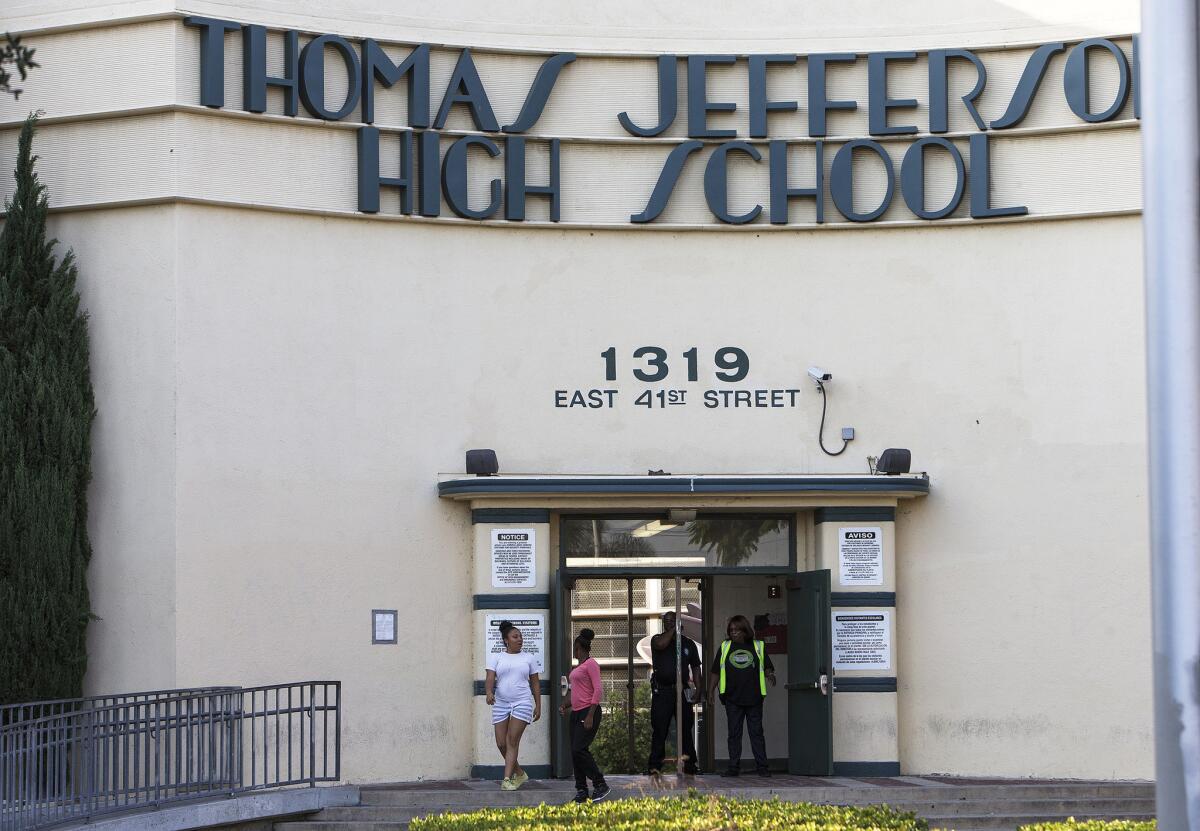L.A. Unified to require ethnic studies for high school graduation

- Share via
Students in the Los Angeles Unified School District will be required for the first time to take ethnic studies classes as part of an effort to encourage stronger cultural understanding.
The idea, brought forward by Board of Education members Bennett Kayser, George McKenna and Steve Zimmer, is aimed at narrowing the academic gap between minority students and their white and Asian peers by pushing students to achieve through the exploration of different perspectives in literature, history and social justice. More than 90 languages are spoken in the district.
The school system allowed ethnic studies classes in the 1990s, but let the schools decide whether to offer them. Few provided the courses. This time, they will be a graduation requirement at all high schools.
Jose Lara, a leading advocate of the move and a social studies teacher at Santee Education Complex, said students develop a better sense of self-worth when they learn about themselves and their history.
He said teachers will have the freedom to craft curriculum to suit the needs and interests of their students. “In East L.A., it might be Chicano history. In Koreatown, it might be Asian American courses,” he said.
A task force of students, parents, district officials, experts and teachers will determine how much curriculum will be developed and how much will be adapted from other districts, Zimmer said.
Supporters of the measure succeeded in Los Angeles despite the failure of similar efforts elsewhere. This year, California lawmakers proposed legislation to look into providing ethnic studies curriculum statewide, but that effort stalled for lack of funds.
A movement to require Mexican American courses in Texas recently failed. Educators in Tucson are working to rebuild high school ethnic studies courses after a popular Mexican American studies program was dismantled by the state.
In Southern California, supporters gained momentum after El Rancho Unified School District in Pico Rivera passed a measure in June requiring ethnic studies course work. The class of 2016 at El Rancho High School is believed to be the first in California with such a graduation requirement.
Teachers in the 9,830-student El Rancho district worked to develop related courses, including an expansion of Mexican American heritage classes, a multicultural art class and a minorities in literature course, said Lara, who is also the vice president of the El Rancho board and co-sponsored its proposal.
After El Rancho’s action, Lara and others pushed Los Angeles school officials to follow.
Efforts for classes in diversity have also gained traction in higher education. Most University of California campuses and many other colleges require undergraduates to take a course on ethnic, cultural, religious or gender diversity. UC San Diego adopted such classes in 2011 after a series of racially inflammatory incidents. UCLA’s Legislative Assembly recently approved a similar proposal, a key hurdle in requiring the classes for all undergraduates.
And, earlier this year, Cal State L.A. faculty voted to require two diversity-related courses, including at least one that focuses on race and ethnicity.
By the 2017-18 school year, every L.A. Unified high school must offer at least one semester of ethnic studies. The graduation requirement takes effect in the 2018-19 school year.
The effort was largely driven by students, who wrote letters, led petition drives that gathered thousands of signatures and met with educators and elected officials to build support.
“This is a reform that came from the bottom up,” Lara said. “It’s students demanding more from their education.”
About 19 L.A. Unified schools offer 27 ethnic studies courses, but students had little incentive to enroll because fewer than half are approved for credit toward enrollment in the University of California.
In L.A. Unified, 74% of students are Latino and nearly 10% are African American.
Michelle Thomas, 16, a junior at Maya Angelou Community High School, said she was inspired to support the move after taking ethnic studies courses in 10th grade. She enrolled in a Latin American and an African American studies class and came away with a better understanding of her Latino neighbors.
“Some of us in my neighborhood, we’re torn apart from each other, we fight against each other,” Thomas said. “But we shouldn’t fight, we should be together. We’ve been fighting the same struggle.”
She helped organize petition drives that gathered thousands of signatures and helped plan rallies in support of the courses.
“I’ve never experienced such a victory before,” she said. “It shows that when students organize, we can actually get things done.”
Twitter: @sjceasar
More to Read
Sign up for Essential California
The most important California stories and recommendations in your inbox every morning.
You may occasionally receive promotional content from the Los Angeles Times.














